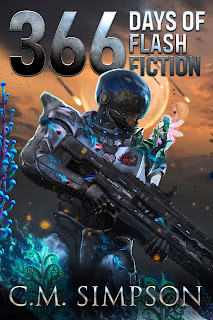An Extract from This Month's Release: The Difficulties of Sleep
I've decided to celebrate each release with a series of extracts that run for the month it's released in. This month saw the second edition of 366 Days of Flash Fiction released. Links to the collection can be found at Books2Read at: https://books2read.com/u/b6MrN0
The Difficulties of Sleep
Written on July 11, 2016, for the March 31 entry of 366 Days of Flash Fiction, this piece was inspired by the theme of Chuck Wendig’s flash fiction challenge for July 1, 2016: Insomnia. The challenge was to incorporate the inability to sleep in a story of 1,000 words or less. I did not expect what I came up with.
The nights are long on Idris 94—and none of us can sleep.
The nights are full of sound, soft rustling, the snap and crackle of dried leaves, the moaning of the wind—and the moaning of the dead, the screams of the unfortunate living, and the wet, tearing sounds of flesh being eaten. We’d block them out, if we could, but we cannot. They are carried on the wind, like the scent of death.
They told us the dead would starve, and the virus would die out with no more prey to host it. They were wrong. Viruses mutate—and, while there are survivors, the prey is ever-present. We live on a dead world, a world of the dead. Each birth is watched with trepidation. Every living child is celebrated. We have sterilization chambers for the living, the unliving, and the dead.
We’ve lived with the unliving so long, that the virus is common knowledge. People recognize the symptoms and no longer stick around long enough to become a menace to those they love; they simply incarcerate themselves in the nearest sterilization chamber and let the timed procedure run its course.
The machines keep tabs on fever, on the levels of virus in the blood, on the moment when death occurs, and the moment when it ceases to be permanent. The chambers used to be called quarantine chambers, but that term contained too much hope.
We’d rather be honest. Ninety-nine percent of those who enter a chamber aren’t coming out again, and, of the one remaining percent, most won’t be the person they were. We accept that, now. Too many have succumbed for it be otherwise.
I’m sitting in a sterilization chamber. It’s strange. I’d always imagined the chambers to be white-walled and sterile, but it seems we are more merciful than that. Hope was long ago identified as the greatest protector against death—yes, even at one percent—and these chambers are filled with hope.
The internee is surrounded by beauty, either a natural landscape, or a garden, or a view onto an old-fashioned mall, whatever the machines detect is most relaxing for them. I’ve ended up in a rainforest-surrounded cabin, with a view of a distant city. The sight of it is soothing, but the scent of the trees and earth, and the birdsong is also necessary. I never want to leave, which is a good thing.
And boredom is not a problem. I can play games, or I can develop my career, or I can study something for the sake of studying it, but there is always the hope of reaching the next level, of getting out and using my new-found skills…or so the illusion goes.
When the fever reaches a certain point, the machine tells me I must enter the medical cabinet. I eye the box with doubt, and a little fear.
“It is necessary,” the machine states, “if we are to treat your symptoms, and save your life.”
I climb in the box. It is a time of nightmares and rage, and I remember where the virus came from. Humans. So full of hate and distrust that they crafted their own doom. And hunger. I am so hungry.
I run through the menu in my head, but nothing appeals. I go through my memories of food, but nothing soothes the hunger. I try thinking of my best friend. Perhaps his sense of humor will take my mind off my stomach, but it doesn’t.
In my mind, Myron looks delicious. Part of my head wonders how he should be cooked to bring out all the flavor—and that is what saves me… I think of cooking my friend.
I think of cooking him, and it makes me feel ill. The hunger subsides, coils down inside me, hides where the machines can’t see, which I thought was impossible, but now I know it’s not. I wonder how many more of us there are, hiding out amongst the humans, and then I remember how much trouble the humans have sleeping.
I think about that, as I exit the sterilization chamber—cured…or so they say.
The humans have trouble sleeping, in spite of the fact the dead cannot enter their stronghold, in spite of the fact they should have become immune to our moans, to the sound of those living outside dying and being eaten by the unliving, and then I realize.
Their system of voluntary sterilization saves us all, because the feasting goes on in secret—inside the walls of their refuge, where true sleep is rare, but the meat is rarer still.
Cover art is by Jake at JCaleb Design, and links to 366 Days of Flash Fiction can be found on Books2 Read at: https://books2read.com/u/b6MrN0



Comments
Post a Comment